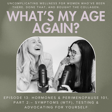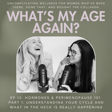Become a Creator today!Start creating today - Share your story with the world!
Start for free
00:00:00
00:00:01

Ep 17: “The Sneaky Culprit: How Blood Sugar Messes With Your Energy (and Everything Else)”
Ever wonder why your energy crashes mid-day… or why you’re suddenly dealing with mood swings, cravings, brain fog, or stubborn belly weight?
Here’s the thing: blood sugar is at the root of so many symptoms we see in perimenopause and it’s often the missing piece in the hormone conversation.
In this episode, we’re diving into:
- How blood sugar actually works (and why it matters way more than you think)
- The connection between insulin, cortisol, and your energy
- Simple ways to balance your blood sugar every day
- Why movement, sleep, and stress management are key to keeping your energy stable
This is a conversation we have with every, single, client… because it’s foundational.
Links:
- Link to our episode where we discuss the window of tolerance: Here!
- Link to our sleep episode: Here!
- Glycemic: https://glycemicindex.com/
Where to find us:
Or email us at: wmaapod@gmail.com
Where to find Tanya:
IG @tlcholistic
FB @tlcholistic
Book with Tanya: https://tlcholistic.janeapp.com/locations/tlc-holistic
Join the TLC Community: https://www.patreon.com/tlcholistic
Where to find Kim:
Book with Kim: Complimentary Connect Call
Transcript
Introduction to the Podcast
00:00:00
Speaker
Welcome to What's My Age Again, the realest podcast for women who are done chasing trends and ready to feel empowered. Hi, I'm Kim. And I'm Tanya, holistic nutritionists and childhood best friends who've been there, done that, and bought the collagen.
00:00:16
Speaker
more than once. Each week we provide actionable steps that you can start today to help you thrive through every decade to come. We're cutting through the wellness noise to bring you honest conversations about aging, hormones, health, beauty, mindset, and everything in between.
00:00:33
Speaker
You see, we're also on a mission to age gracefully one WTF moment at a time. Backed by research and real life, we're here to share what actually works, what's a waste of time, and how to truly thrive through the messy, magical midlife transition.
00:00:49
Speaker
We're so happy you're here.
Understanding Blood Sugar and Hormones
00:00:51
Speaker
Let's dive in. Hi, everybody. Welcome back to What's My Age again. Hi, Tanya. hey Kim. How are you? I'm good. We have a packed episode for you today. Thank you all for being here and listening week after week.
00:01:05
Speaker
um So we're just going to dive right in because we want to maximize the half hour we have with you today. Yeah, it's a packed half hour, but it will be directly related to my rant um about Tim Horton's protein beverages. And now Starbucks has them. So keep that in mind as we start this topic because relevant.
00:01:28
Speaker
Oh, Tanya. Yeah.
00:01:31
Speaker
And if you don't know what Tanya's bat tanya iss talking about, go back a couple episodes and you can hear her rant because it's very warranted. Oh, my goodness. Thank you. I thought it was too. All right, we're diving in today on a conversation around blood sugar.
00:01:45
Speaker
And the reason we want to dive into this is, quite frankly, probably every single one of my clients who have come to me who are over the age of 30, the first thing they say when we're doing our first meet and greet is, I want to balance my hormones.
00:02:02
Speaker
I want to balance my my hormones are out of balance. And what they're referring to is estrogen and progesterone. But
Role of Insulin in Health
00:02:09
Speaker
one hormone that we tend to forget about, or not we tend to forget about, but sometimes our clients tend to forget about, is insulin.
00:02:18
Speaker
And... how foundational that is to supporting our health. And so some of these, you know, for example, my clients that are coming and speaking to this, some of those main health complaints I see are things like mood swings or sleep disturbances, night waking specifically, or anxiety.
00:02:39
Speaker
You know, we all hear about brain fog, um, cravings for carbs and sugar, or the big, big, big one too, low energy or drops of energy throughout the day.
00:02:50
Speaker
Absolutely. And I love how you said, um it's we forget about this hormone. We don't, can't clarify, but I think that it's forgotten about and overlooked maybe because it's misunderstood.
00:03:05
Speaker
And also a lot of us maybe didn't even know that insulin is actually a hormone. And you know that i love to talk about our pyramid. So you're right, people come in and they write on their intake sheet, I want to balance my hormones.
00:03:21
Speaker
And estrogen and progesterone are the ones that we're mainly talking about. And that's the tip of the pyramid. But insulin is actually foundational to that. And it's something that we have to really focus on.
00:03:34
Speaker
And I think just to start, if I can take a moment moment to define insulin, um It is a hormone, as we said, and it is made by the pancreas.
00:03:45
Speaker
And to keep it simple, its primary job is literally to help your cells uptake glucose from your blood.
00:03:56
Speaker
That is what it does. And let me drop an analogy because that would be shocking. So this is the most simple one that always comes to my mind.
00:04:10
Speaker
Our cells are the garage and glucose are the cars and those cars need to get in to the garage. Guess what? Insulin is the automatic garage door opener. It's not the eighties anymore.
00:04:23
Speaker
Everybody has an automatic garage door opener. but So If that garage door opener is malfunctioning for one reason or another, because there can be many reasons for garage door malfunction, and there can be several reasons for an insulin malfunction, also known as maybe issues with insulin sensitivity.
00:04:44
Speaker
Guess what? Cars aren't getting in. Glucose is not getting in. They're going to start to back up on the road. It's going to cause a problem. So insulin is that
Regulation of Blood Sugar Levels
00:04:54
Speaker
foundational hormone.
00:04:55
Speaker
that allows our cells to uptake glucose. And we need to keep that in mind because it is important and crucial for estrogen and progesterone. Absolutely, Tanya. And, you know- glucose is actually energy for our cells. So as Tanya just mentioned, if that energy or that glucose isn't getting into our cells or that insulin is malfunctioning, or there's some insulin resistance there, that is where those drops of energy, that is where you're feeling that low energy sluggishness.
00:05:27
Speaker
So maybe I can get into a little bit of a science lesson here quickly. Just about how blood sugar works. I will keep you on your toes. Kim has amazing science lessons.
00:05:40
Speaker
They can be lengthy. They're always fantastic. like But we don't have unlimited time. So Kim, take it away. got you. Okay, perfect. Okay. So like I said, blood sugar or the glucose is fuel, energy, energy for our cells and fuel for our brains. And our bodies, we need a certain amount of glucose to be used for that energy. And our body actually really keeps our blood sugar in a really, really tight range. You've probably gone to the doctor and seen where your blood sugar range is. And we, our body is, like we always say, is so smart and it keeps, it works hard to keep our blood sugar in that tight range. So
00:06:23
Speaker
What happens when we eat a meal is that glucose is metabolized and then released into our bloodstream. And then as Tanya mentioned, our pancreas is like, we're ready. We produce the hormone insulin, which will then help push that glucose into our cells.
00:06:41
Speaker
Like Tanya said, that garage door opener to put that glucose into our cells. Now, if we have a really sugary, starchy meal full of those refined carbs and sugars, and our blood sugar spikes really high, our blood our our pancreas needs to produce more and more insulin to help bring that glucose back into normal range. Now, I worked in retail before, so I do have an analogy, but it's a retail analogy. Here we go. Oh, Kim with the analogies. Let's go. Let's see if it's as good as Tanya's analogies. Here we go. Okay. Okay.
00:07:15
Speaker
When that blue blood glucose spikes... Say the cells are like the shop floor, right? our Our insulin is pushing the glucose to the shop floor and say that's full, right?
00:07:29
Speaker
No more merchandise needs on the shop floor. Then they need to put, the insulin will push to the back of house, which would be like our muscles, our liver. And if that's full, it gets stored, warehoused as fat.
00:07:43
Speaker
Because like I said, our body wants to put, bring our blood sugar back into that range, that tight range. How that analogy? I can literally say that is one of the best analogies I've ever heard. I'm not even lying.
00:07:57
Speaker
I'm taking that. I love it. And you touched again ah upon like even the pyramid of hierarchy. You talked about liver, which I'll get back to in a second. Amazing. So you also mentioned something um in your science lesson before your analogy stating insulin resistance.
00:08:12
Speaker
resistance.
Consequences of Imbalanced Blood Sugar
00:08:13
Speaker
Right. And I think it's important to define that as well. So you explain the more sugary, the more starchy meals we have, the more insulin that that the pancreas has to release.
00:08:25
Speaker
um So what happens if we are someone who is on this blood sugar rollercoaster, For too long, we developed something that is called insulin resistance. And really, the name says it all. Like, that's how I used to remember it.
00:08:41
Speaker
Our cells become resistant to insulin. They're like, girl- That car door is not that- but No. The clicker is not working. Yeah. the think Has been broken. And this is where our insulin receptors, they're not sensitive to insulin anymore. So it's hanging around, but it's not opening up those, you know, those cells.
00:09:01
Speaker
So this causes our body to produce even more and more insulin to support getting your glucose into the cells. Absolutely. And Tanya, let's just touch really quick because we talked about that blood sugar rollercoaster going up, but what happens when it comes down? Because what goes up must come down.
00:09:20
Speaker
And so just quickly, you know, When we don't listen to our bodies, when we don't feed ourselves at appropriate times throughout the day, we're not listening to our cravings, or maybe we're feeling a little dizzy, or we work through lunch. How many of our clients work through lunch?
00:09:37
Speaker
How many of our clients do we meet at 1 p.m.? And they're like, oh my gosh, sorry, I'm just eating in our session. I haven't eaten at all today, and I'm dead inside. I'm feeling dizzy, and I have brain fog. Yeah.
00:09:48
Speaker
And I am dead inside being like, you haven't eaten today. All right. And hey, for those, I i just said, I'm using a retail, for example, because I worked in marketing and PR for so long. And for those of you who've known me from that previous job, you know that was me.
00:10:03
Speaker
Definitely working through lunch and wondering why I was dizzy and brain fog in the afternoon. You're right. and and so Yeah. I'm going to pair onto that as well. From all of my trucking years, you think I didn't live on like 17 coffees and a pack of smokes until 2 PM and then decide to get an A&W. Right. So yeah. Now I guess I cringe more when someone's like, haven't eaten yet. Cause I was like, oh girl, this is where the problems are. So yeah.
00:10:25
Speaker
Well, see, and the the more, you know, the more we know, the better decisions we can make. So, right. So what happens when our glucose goes low? Okay. So this is, and we don't feed ourselves.
00:10:37
Speaker
So when our glucose goes too low, our emergency system kicks in. And I think we may have talked about that and in earlier podcasts, but essentially what that means is our adrenaline and our cortisol will act well be released because think of the fight or flight response, you know, when we're running from that tiger, glucose, like the cortisol, will essentially get that glucose to be, you know, in our bloodstream so that we can fight or fly or flee.
00:11:07
Speaker
um And so that cortisol is is bringing that glucose level back up.
Hormone Balance and Blood Sugar
00:11:14
Speaker
Exactly. So when cortisol spikes, we did talk about this, but just to give that quick analogy, when cortisol spikes,
00:11:22
Speaker
So does our blood glucose. And then in turn, we again ask the pancreas, Hey girl, we need more insulin and the whole cycle keeps going. So what goes up must come down.
00:11:35
Speaker
And I think I'd like to refer back to the pyramid for a moment um that we talked about in the perimenopause 101 episodes. If you haven't listened to them, we talk more in detail about it there, but we have to think about healing and supporting our hormones as a pyramid and you have to start with the base.
00:11:56
Speaker
So the base again is what our nervous system and our adrenal glands. We've talked about that, but we haven't yet really talked about the middle piece. The middle piece is our blood sugar, our insulin, our liver, our digestion, our microbiome.
00:12:14
Speaker
That's a big piece. And then the tip is the estrogen and progesterone. We cannot balance effectively root cause estrogen and progesterone without the two bottom pieces. And this middle insulin blood sugar in my opinion, is very often overlooked in conventional medical systems, especially of women getting to our age, complaining about hormonal imbalances.
00:12:41
Speaker
Well, and Tanya, the thing is too, is everyone always talks about root cause, root cause. Well, hormone imbalance is not a root cause. Like it's what's under it. Exactly. As you said, liver digestion, gut health, blood sugar balancing,
00:12:59
Speaker
new And then, of course, the very base of it is that nervous system. I love your pyramid analogy. No, thank you so much. And I mean, it really does hold true. It's so, so important.
00:13:15
Speaker
So, you know, as Tanya mentioned, obviously the and estrogen and insulin connection here is important. And so go back to that episode, perimenopause 101, when we talk a lot deeper in that.
00:13:28
Speaker
But I think that kind of like sets the stage. Don't you think, Tanya, did we forget anything to sort of... I think that sets the stage. I think so too. What we want you to come out um with an understanding of up till now is that blood sugar and insulin are...
00:13:45
Speaker
integral in every single symptom that you know we have mentioned. And this is just a short list, but our most common symptoms that we relate to hormones, those mood swings, anxiety, weight grain around the middle, brain fog, cravings, low energy, night wickets. And low energy drops during the day too. Like yes you're finding at three o'clock, 3 p.m. or like 11 a.m. m you can't keep your eye open or like what Tanya was saying, she'd be going and reaching for that coffee. Yeah.
Maintaining Balanced Meals
00:14:15
Speaker
That's a sign there. perfectly perfectly Definitely a sign. So that's what we want you to know up until now, and then have that understanding where insulin, liver, all of that lies in the pyramid. It's foundational and also an understanding of what insulin is and what insulin resistance is.
00:14:35
Speaker
Now that we understand these basic points and how they are so integral to our healing and balancing, Maybe we can actually get into how to support your blood sugar. And again, this is broad range. These are things that everybody can do, but every single person, I don't care who you are, should be working with a natural healthcare care practitioner of some sort to then go deeper and refine these pillars and you know these points.
00:15:07
Speaker
Absolutely, Tanya. And these are this, what we're going to talk about next, we can talk about just like what we talked about in the sleep episode. These are foundational things that kind of you can check off first, be be doing those things. And then if those symptoms are persisting, your practitioner is going to want to look at things like thyroid.
00:15:26
Speaker
They're going to want to you know, there's going to be other underlying causes that you know, as Tanya said, the dominoes, right? They're all connected. So here's some of the foundational things that you can do to support your blood sugar and get off that blood sugar rollercoaster So, and talking about them, I love that you brought that back, Kim, like we talked about foundational things, remembering too, they're a practice.
00:15:50
Speaker
So you have to put them into practice consistently, right? yeah So these are some of the things that we need to look at practicing consistently to really get a handle on our blood sugar, our insulin.
00:16:02
Speaker
And number one, I want to talk about that dietary component because it's very important. What is on our plate? When we talk about macros, we talk about fats, proteins, and carbohydrates. Those are the macronutrients.
00:16:20
Speaker
And how they're balanced on our plate matters. The ratio of these matter. And I'm not going to dive deep into this because we're going to start getting questions.
00:16:32
Speaker
How much protein do I have for meal? How many grams? That is a completely different, probably volume of podcasts, but a balanced plate and how to balance it matters. Things like protein, things like fat, they don't inherently heal for lack of a better word, blood sugar inbalances,
00:16:50
Speaker
and insulin, but they work with all of the foods that we're having to balance them, to keep things in check along with other foods in the right ratios.
00:17:02
Speaker
ab Yes. And it's interesting. I think I talked about i think i talked about Josh Katalis' analogy and another in another podcast, but I love this. so So many of us are conditioned to thinking that fat is is bad. And what's happened in a nutshell, so many of us are very carb heavy on the morning. You think about people going out and grabbing that bagel or having the piece of toast and And what we just talked about with that blood sugar roller coaster, that simple carbohydrate is digested quickly and it spikes that glucose.
00:17:35
Speaker
And so what Josh Gitalis mentioned, and I loved this analog analogy so much, was that carbs are like the kindling. They're the quick energy, the quick fire, and they spike that blood sugar really fast, where the the fat is that big,
00:17:51
Speaker
log on the fire. That slow burning, it's going to keep you satiated longer. It's going to give you more sustained energy, not that quick energy, but the sustained energy, and it's not going to split spike your blood sugar.
00:18:05
Speaker
So like Tanya said, you if you're going to have carbs, a really easy way of saying it is when you're eating your lunch, dinner, snacks, breakfast, Take a look at your plate. plate You have some carbs.
00:18:17
Speaker
Where's your fat source? And where's that protein source? And then you're not looking at a carb-heavy meal where your your blood sugar is going to spike. I think about this every single time I have a fire. I'm not joking, Kim, every time, because it was such a good analogy for you to bring up.
00:18:36
Speaker
And it's right. If you, if I just throw a newspaper in my fireplace, I'm done. That thing is going to give me a burst of flame and heat and that's it. So love this so much.
00:18:46
Speaker
And then the types of food matter. Like Kim said, the right kinds of fats, proteins, and carbs, um, Lower glycemic index foods. Glycemic index is the rate in which a food has an impact on our glucose levels once we consume it in our blood.
00:19:05
Speaker
This is a big topic. So I think what we're going to do is we're going to pop a note in the show notes somewhere reputable where you can learn a little bit about glycemic index GI foods. And which ones are higher, which ones are mid, which ones are low, but definitely something to keep in mind when you're loading your plate up with different foods, how they also react with your blood sugar, but it's not the only factor.
00:19:28
Speaker
It's not the be all and end all. Absolutely. And for today's pot, like for today, I think one thing when you're thinking about high glycemic foods, a big one is refined grains.
00:19:41
Speaker
And so what that means is that your grain, whatever it may be, has the fiber has been removed. The protein piece has been removed. And you're, what you're left over with is that starchy, sugary part. Right.
00:19:55
Speaker
of the grain which will spike that blood sugar. So when you're looking at grains, for example, you want to look at whole grains so that they have they they still have that fiber intact, which is going to help support that blood sugar balance.
00:20:11
Speaker
For sure. I love that. And even we talked to you just now refined grains as an example, refined carbohydrates. Let's just say we refined foods in general So there's this whole fear of fruits, let's say with blood sugar.
00:20:27
Speaker
um Yes, certainly some are higher in GI than other. Listen, the way that I see it and the way that I practice is the more whole foods you have, the better. Fiber is also exceptionally important.
00:20:40
Speaker
when it comes to um our diet. And when we're eating whole foods, honestly, nature is smart, just like our bodies. And they have packaged that perfectly.
00:20:53
Speaker
They have put fiber and the right amounts of phytonutrients and macros in there. So the more you can focus on whole forms of foods, And the less refined, that's what you want to see. That's where the fiber is in these plant-based whole foods.
00:21:09
Speaker
And fiber is like that glass ceiling where your blood sugar wants to spike. I know you can't see me. And it just hits the ceiling and
Managing Hunger and Cravings
00:21:18
Speaker
it's forced to go straight. It acts a lot like the fats and the proteins. It stabilizes that fast-burning pop of carbs.
00:21:27
Speaker
Well, exactly. And it goes so much to support digestion, um all the insoluble and soluble fiber, which helps our, which again, as Tanya mentioned, is foundational when it comes to balancing our blood sugar, balancing our hormones in general.
00:21:44
Speaker
Yeah, excellent. And so, yeah, we will put the glycemic index in some in the show notes so that you can go in there and check it out. But just, yeah, a basic is that whole foods,
00:21:55
Speaker
and and looking And not looking at refined foods using that term. Absolutely, for sure. And then we can also look at not necessarily what's on our plate, but when our plate is getting into our bellies, as we kind of talked about a little bit earlier, is the timing of meals is absolutely crucial when we're managing blood sugar.
00:22:17
Speaker
Yes. And like we talked about earlier, how many clients have said to me, oh I skipped lunch or i'm I'm hungry at three. I don't know why. Because, you know, again, like timing is so important. We don't want to go too long. And what a lot of times we talk to clients about is listening to our bodies. And we can go into, Tanya, I think another episode, we'll be talking about cravings.
00:22:44
Speaker
Let us know if you would be interested in that topic. Because there's so many reasons for cravings. Could be emotional. Could be a lot of different things. But one is that our body is trying to tell us that our blood sugar is getting low.
00:22:57
Speaker
Maybe we did have that carbohydrate-heavy lunch. We didn't have enough fats and proteins to sustain us. And our blood sugar is dropping. And so we need that snack to support us.
00:23:09
Speaker
um And let's face it, if you're having lunch at 12 o'clock and you're not having dinner until 6.30, that's too long. That's too long. So, you know, making sure that you're having well-balanced meals throughout your day is so important.
00:23:26
Speaker
Yeah. And I'd like to touch upon that hunger is a good feeling to have. And in this day and age where we have everything at our fingertips, every fast food drive-thru, you can imagine full pantries, you know,
00:23:39
Speaker
we, it's not like the archaic body where you would go through times of hunger and you know, times where this food is more scarce. So, but it's a balance. Hunger is good.
00:23:52
Speaker
Being starving is not. So exactly like you said, Kim, if I'm eating at noon, I'm not just going to plan to eat every hour necessarily because I feel like I should. But when I start to get that little rumbly in my tumbly at like 3 p.m., I've made it to a little bit of hunger, but I'm not going to push the boundaries.
00:24:11
Speaker
It's like a preventative thing because guess what? If I do push the boundaries at 530 when I'm preparing dinner, I am ravenous and I'm going to tear into all of the refined carbs I have because I've waited too long.
00:24:22
Speaker
And I know I'm not alone because I know all of my clients tell me the same thing. And it is so important to find the balance of feeling that hunger, but then fueling yourself preventatively,
00:24:33
Speaker
before it's too late. abs Yeah, exactly, Tanya. And like I said, our bodies are smart. Our body isn't going to be like, give me some protein. It's going to be like, give me the fastest thing that is going to bring my blood sugar back up because you've let your blood sugar drop, right? and so lit And what I always say to clients too, a little tip is, say every day at three o'clock, you start to feel hungry or you start to crave that chocolate or sweet or whatever it is,
00:25:00
Speaker
Give yourself a snack, a well-balanced snack at 2.30 and see if those cravings disappear because that shows you that your blood sugar is dipping at three o'clock. That's such, that's so, so important. I love that.
00:25:13
Speaker
um And yeah, the body's going to crave when we let it go too long sugar and sugar. You know what, Kim, you pointed this out to me when I couldn't point out for myself. So fascinating too.
00:25:25
Speaker
um When I was sick and I said the only thing I could stomach for a while, all I wanted was fruits and like bagels with butter. I would just have thought like, I don't know what I thought because I just wasn't thinking because I wasn't nourishing because I couldn't. And you're like, because I was sick. And you're like, yeah, your brain wants that quick sugar.
00:25:45
Speaker
And that's what we just don't want to get ourselves into on the day to day. We want to be able to have those balanced preventative
Role of Movement in Blood Sugar Management
00:25:51
Speaker
snacks. And to keep that blood sugar balanced. And probably if you're working at keeping that blood sugar balanced, you'll find those cravings will disappear. But again, there could be a lot of reasons. We'll get into that in another podcast.
00:26:03
Speaker
Let's... So obviously diet, pillar number one. Another really, really important piece is movement. in keeping that blood sugar stable. So can we talk about that for a second?
00:26:18
Speaker
I love this one so much because we often see um from every single health guru and across like the internet and social media, building muscle, building muscle for strength as we get into perimenopause and menopause and all of that.
00:26:32
Speaker
But what we often don't see being talked about in the mainstream is another another reason to build muscle is because muscle stores glucose. And Kim, because you've changed my world with your analogy, this goes back into this is the back of the house.
00:26:50
Speaker
This is when the floor is full. So when we have an abundance of glucose and the floor is full, our blood sugar, our blood is full of glucose. and insulin is not taking it in the cells fast enough, where does it get stored?
00:27:05
Speaker
In the muscles next. The more muscle fibers we have, the more we can store down the broken down version of glucose, glycogen in these muscles.
00:27:18
Speaker
The more back of house space we have. yeah So body composition is key here. And this is what we always talk. So I love your point, Tanya. It's so true. Everyone talks about, you know, strength building for longevity and women in perimenopause, but they don't necessarily always give the nitty gritty why. And blood sugar is key to this.
00:27:40
Speaker
The more muscle bias mass you have, the more storage space, the more support of blood sugar. Yeah. Another piece of movement um is having a little bit of movement right after you eat.
00:27:57
Speaker
Because we talked about, you know, we we talked about the storage space, right? But like, as you're selling off the goods, as you're moving, as you're expending energy, you have more space on the floor. movement movement after you know, your meals, like could be just a 15, 20 minute walk is great to support blood sugar balancing.
00:28:24
Speaker
Yeah, it doesn't have to be anything crucial. Exactly. Why not sell the merchandise and not put it into storage, right? So sell your merchandise, guys. Use your energy. Use the glucose. And for me, I know everybody's busy. our all All of our lives look different. Get up from your desk.
00:28:38
Speaker
Do a couple squats. Literally move around. um Sometimes when I can't leave my house, either I don't have enough time or the weather's really crappy or whatever, I walk around my house. I go down the stairs, walk around the kitchen table, up the stairs.
00:28:51
Speaker
Um, it just getting that movement in is so, so important and it makes such a difference. Absolutely. Get the heart rate up. Yeah. it's such It's so interesting because just like you said, everyone's so focused on, on muscle building and we talk about why that's so important, but getting that heart rate up is also so key using that energy.
Impact of Sleep and Stress on Blood Sugar
00:29:13
Speaker
Yeah. And which is exciting. I'm just going to say it anyways. It is super exciting. We're going have an episode coming up about the dichotomy between strength training and cardio. And that's just a whole part of why it's important to have both.
00:29:29
Speaker
Absolutely. Absolutely. Well, I think so movement. Okay. so we talked about diet and the keys there. we talked about movement and how important it is to have movement throughout your, your day.
00:29:44
Speaker
The next one is tough because it's a bit of a vicious cycle and we talked about it in another episode, but it's sleep. Yeah. That's one of the circle hamster wheels. That's difficult for sure. And we're like, well, sleep better. Your blood sugar will be good.
00:29:59
Speaker
and And then they're like, well, Kim, Tanya, I can't sleep because I'm waking up in the middle of the night when my blood sugar drops. so And we're like, fix your blood sugar. We know. We understand. Um,
00:30:10
Speaker
I feel like I understand this big time as well because I think it was really affecting um my personal sleep. But listen, the sleep piece, as we talked about in the sleep episode and briefly here, we said it, when cortisol goes up, glucose goes up.
00:30:26
Speaker
When glucose, you know, goes up, everything, our systems start to wake up and we're jolted up in the night. Sleep episode is really going to give you detail about this. So we'll leave it for that.
00:30:37
Speaker
But when we start to see that blood sugar balance, when we start to take practice Start with the first things, the dietary things we talked about, and the movement when we start to put those into practice and keep them consistent.
00:30:53
Speaker
That's where the sleep piece helps. We can't necessarily start with just magically shifting our hormones with this cortisol-insulin dichotomy, but starting on the diet and starting on the movement piece are really going to propel the sleep portion.
00:31:09
Speaker
Yes, Tanya, exactly. and it's And so again, what Tanya mentioned, what we can do for sleep is just put the foundations in place, as well as the diet and lifestyle that Tanya just mentioned. And then you'll find the needle will move and you may all of a sudden be like, wait a second, I didn't wake up for two hours last night.
00:31:33
Speaker
Yeah, no, for sure. The dominoes, the dominoes start to take over of those foundations. And then this one is a huge one. Again, talked about it Base of the pyramid. we weren' We're not going to beat it in to you again, but stress management.
00:31:49
Speaker
um The connection between your stress hormones, cortisol, again, we just mentioned, and insulin are direct. If one is up, the other is up. And Kim, again, briefly, I can attest to this.
00:32:03
Speaker
Unbelievable. I had sleep issues a couple months ago now and they're behind me. And no, it wasn't insulin. It wasn't, i sorry, it wasn't melatonin. It wasn't estrogen. It wasn't progesterone I had to focus on.
00:32:16
Speaker
All I had to focus on was my adrenal glands and my nervous system. And I did that with, you know, what worked for me, a tonic that works for me. and asleep like a baby.
00:32:27
Speaker
So that's just a testament to how important that foundational piece is, stress management and your nervous system. Yeah. And I think, I mean, it's sort of the same vicious circle that we just talked about with sleep. Some of you are probably going, okay, yeah, but my life is stressed, yeah like stressful, like, okay, i'm I'm now stressed about being stressed and now my cortisol and blah, blah, blah, blah.
00:32:50
Speaker
But as Tanya mentioned, the foundations is what we put in place. And I think, again, we talked about it on another episode, And we can link that one in the show notes as well when we talk about that window of tolerance and we talk about building resiliency to stress. Because let's face it, especially us in our perimenopausal years, we're dealing with possibly aging parents.
00:33:13
Speaker
We're dealing with probably huge work obligations. We've got... we've got you know, kids pugh possibly. We've got life. We've got our own perimenopause issues that we're going through. So it's like the stress is real. And we're not saying that we need to change the actual stressors in our life.
00:33:33
Speaker
But what we're saying is how do we make our body more resilient to that stress? And resiliency will help support your cortisol, supporting your adrenals, like Tanya was just saying, is helping to support cortisol, which will in turn support blood sugar.
00:33:49
Speaker
I couldn't have said it better myself. So case in point, spoiler alert, I did not get rid of all my stress, but what I did is through supporting my adrenal glands, I increased my resiliency and my resistance and my body's ability to process that stress.
Foundational Pillars for Health and Hormone Balance
00:34:04
Speaker
So yeah I wish we had a magic wand that we could just all live like magical stress-free lives and just have me time all the time. But that's not the reality.
00:34:15
Speaker
It's not the reality. Definitely not the reality. So these, you know, four pillars again, I know we keep revisiting them over and over again, but in different ways, but you can really see foundational again, pillars.
00:34:30
Speaker
Our blood sugar is looking at, you know, our diet, our movement, our sleep and our stress. And then foundational to balancing our hormones, which is why all of you ladies, the majority are seeking help and coming to see us, is this blood sugar insulin piece.
00:34:49
Speaker
And that's why it's so important to use these supplements. practices and stay on them and be consistent and see the changes and now understand why yes they're important in your journey and to these symptoms that Kim had mentioned at the start that you might be feeling that would never have been equated to blood sugar before. And now you're going, huh, all right.
00:35:12
Speaker
Makes a
Conclusion and Listener Engagement
00:35:13
Speaker
bit of sense. Yeah. Yes. Well, I hope you all enjoyed this packed episode. As always, you know, if you have any questions, please reach out. We know we we love answering all of your questions through DMs or email.
00:35:29
Speaker
um But yeah. Tanya, thank you. This was a good conversation. And we did it. We made it to like pretty much a half an hour. about dinner I'm like, it's going to be 38 minutes and it's a little bit less. So with that, I'm starving and I'm going to go eat my balanced macro meal and then take a little bit of a jaunt around my house and carry on with the day.
00:35:49
Speaker
Amazing. Okay. Bye everybody. We'll talk to you next week. Bye guys. Hey guys, thanks so much for hanging out with us today. If this episode resonated with you, we would love it if you would hit like, subscribe to the podcast and share it with a friend.
00:36:04
Speaker
We love to hear from you because let's be honest, this show is for you. If you have a topic you'd love us to tackle or want to learn more about something we talked about today, send us a message. We got you.
00:36:17
Speaker
Stay connected with us on social media at whatsmyageagain.podcast for even more knowledge and inspiration between episodes. Kim and I aren't doctors or your healthcare practitioners.
00:36:30
Speaker
Everyone's body is unique, so always consult your own healthcare care provider before starting something new.



















